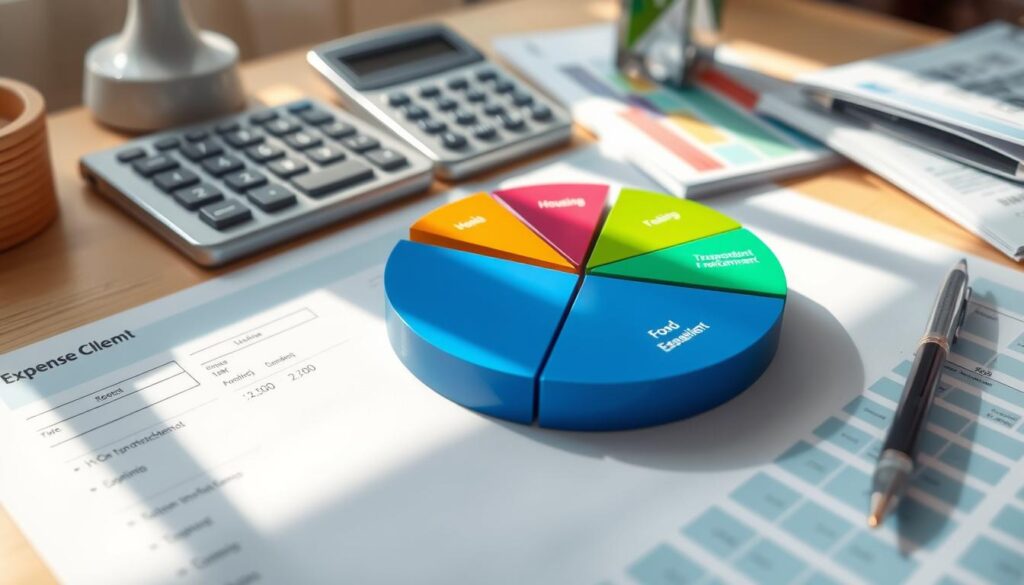Ever wondered why so many people struggle with money, even with a budget? Getting the hang of personal finance is key. By learning from experts, you can take charge of your money future.
Creating a budget is more than just tracking money. It’s a plan for financial freedom. With the right advice, you can face money challenges head-on. It usually takes three to four months to get good at budgeting.
Let’s dive into budgeting together. We’ll share tips and strategies to change how you see money. By the end, you’ll know why budgeting is crucial and how to make smart money choices for more savings and less stress.
Key Takeaways
- Budgeting takes three to four months to master effectively.
- Engaging a budgeting partner can significantly support accountability.
- Setting specific, measurable, attainable, relevant, and timely (SMART) financial goals is vital.
- Tracking progress toward your financial goals keeps you motivated.
- Implementing the 50/20/30 rule can help balance spending across needs, savings, and wants.
- Establish a flexible budget that adapts to changes in your financial situation.
Understanding What a Budget Is
A budget is like a map for your money. It helps you see where your money comes from and where it goes. By understanding a budget, you can spot where you spend too much and find ways to save. It breaks down your money into key parts like income, fixed costs, variable costs, and savings goals.
The 50/30/20 rule is a well-known budgeting method. It suggests dividing your income into three parts:
| Category | Percentage of Income |
|---|---|
| Needs | 50% |
| Wants | 30% |
| Savings and Debt Repayment | 20% |
Good financial planning means knowing the difference between needs and wants. Focus on your needs first to keep up with life’s basics. This way, you can still enjoy some comforts. With smart planning, you can save more money.
Creating a budget is crucial for your finances. Experts say save 15% of your income for retirement. Start with an emergency fund of $500 for small surprises. Save 20% of your after-tax income for safety and paying off debt.
In short, budgeting explained is about managing your money well. It helps you understand your finances and plan for the future.
Why You Should Have a Budget
Having a budget is key to financial health. People who budget are 50% more likely to save money. This shows how budgeting helps you save.
A budget helps you save 20% more, says the Consumer Financial Protection Bureau. Also, 70% of budgeters feel more financially secure. This shows how budgeting reduces stress.
With a budget, you’re 75% less likely to get into debt. This is crucial since the average credit card debt is around $6,000. Budgeting helps avoid debt and eases financial worries.
Tracking your spending can improve your finances. Those who do this spend 40% less. The Federal Trade Commission says budgeting makes you feel more in control of your money.
Yet, only 30% of Americans have a detailed budget. Encouraging more people to budget could lead to greater financial stability. Here’s a table showing the benefits of budgeting:
| Aspect | With a Budget | Without a Budget |
|---|---|---|
| Likelihood of Savings | 50% more likely | Less likely |
| Average Income Saved | 20% more | Less saved |
| Feeling of Control | Twice as likely | Less likely |
| Debt Risk | 75% lower | Higher risk |

In summary, budgeting is vital for financial stability. It helps you manage your money better. By tracking your spending and setting goals, you can secure a stable financial future.
How to Create a Budget
Creating a budget begins with knowing your monthly income. This includes both your gross income and net pay. Gross income is what you earn before any deductions. Net pay is what you actually get in your bank account. Understanding this difference is key to starting your budget.
Then, sort your monthly expenses into fixed and variable costs. Fixed costs, like rent and loan payments, stay the same every month. Variable costs, such as groceries and entertainment, can change based on your spending. It’s important to know both types to get a clear picture of your finances.
After sorting your expenses, add up your income and expenses. Subtract your total expenses from your income to see if you’re in the black or red. If you’re spending more than you earn, look for ways to cut costs or find extra income.
Setting financial goals is a big part of budgeting. Goals might be to pay off debts, save for a big purchase, or build an emergency fund. Aim to save three to six months’ worth of expenses for emergencies.
To improve your financial planning, track your spending. Use tools like Mint to categorize your expenses and see where your money goes. Regularly check your budget to adjust for life changes, like a new job or moving.
Lastly, make saving a priority in your budget. View savings as essential, not an afterthought. Saving helps you reach your financial goals and secures your financial future.
Setting Clear Financial Goals
Setting clear financial goals is key to budgeting. These goals guide your saving efforts. Start by listing both short-term and long-term goals. Short-term goals might be saving for an emergency fund or a vacation.
Long-term goals are just as crucial. They could be saving for a home, your child’s education, or retirement. Breaking these big goals into smaller steps makes them easier to follow.
Try to save 15 to 20 percent of your income for these goals. Learning about setting financial goals takes just 1 to 3 minutes. It’s also important to prioritize your savings goals, which takes about 2 minutes to learn.
Use budgeting tips to help achieve your goals. Regularly check your financial plan. Aim for an annual review to see how you’re doing and make changes if needed. This helps you stay on track with your savings and debt reduction.

| Goal Type | Examples | Savings Duration |
|---|---|---|
| Short-term Goals | Emergency Fund, Vacation, Car Down Payment | Within 1-3 Years |
| Long-term Goals | Home Down Payment, Education Fund, Retirement | 3+ Years |
| Recommended Savings Rate | Percent of Income | 15-20% |
Setting financial goals is the first step in your budgeting journey. Keep track of your progress and adjust your plans as needed. This ensures you’re always moving closer to your financial dreams.
Prioritizing Your Expenses
Understanding expense management helps you make smart money choices. Not all expenses are equal in your budget. Start by categorizing your costs into must-haves and nice-to-haves. Essentials like housing, groceries, and utilities should come first, before spending on dining out or subscriptions.
The Four Walls of budgeting offer a clear plan. These four areas—food, utilities, shelter, and transportation—are your top priorities. By focusing on these first, you meet your basic needs before spending on extras.
Tracking your spending is a great way to improve financial decision-making. For a week, keep an eye on your purchases to spot where you might be spending too much. This helps you move money around in your budget for better use. Remember, your budget needs regular checks to stay on track.
Use budgeting methods like the 50/30/20 rule to guide your spending. It suggests using 50% for needs, 30% for wants, and 20% for savings and debt. Zero-based budgeting also helps, making sure every dollar has a purpose.
Setting up an emergency fund is key. Aim for three months’ worth of living expenses. Also, focus on paying off high-interest debt to boost your financial health.

Monitoring Your Spending Habits
Keeping track of your spending is key to staying financially responsible. Using budgeting apps can make this easier. By recording every purchase, you learn a lot about your spending habits. This knowledge helps you manage your money better.
The 50/30/20 rule is a good way to budget. It suggests using 50% for needs, 30% for wants, and 20% for savings or debt. Knowing the difference between fixed and variable expenses is also important. Fixed costs don’t change, but variable ones do. Keeping an eye on both helps you budget better.
Make time each month to review your spending. This helps you see if you’re spending wisely. If you’re spending too much on wants, it’s time to adjust your budget. This might mean cutting back on dining out or entertainment.
Looking for ways to make more money can also help. Side jobs or selling things you no longer need can boost your budget. Use budgeting apps to organize your spending into needs, wants, and savings. This makes it easier to track and stay on track financially.
![]()
| Expense Type | Example | Fixed vs Variable |
|---|---|---|
| Needs | Rent, groceries, utilities | Fixed |
| Wants | Dining out, vacations | Variable |
| Savings/Debt Repayment | Retirement contributions, loans | Variable |
Monitoring your spending helps you stay financially accountable. By regularly checking your budget and making changes, you can improve your financial health over time.
Budgeting Tips: Provide advice on budgeting and saving money
Effective budgeting needs knowledge and planning. Using a zero-based budget helps you use every dollar for something specific. This makes your finances clearer and can improve your financial health.
Steps to Create a Zero-Based Budget
To start zero-based budgeting, follow these steps:
- First, track how much money you make each month.
- Then, list all your monthly costs, dividing them into fixed and variable expenses.
- Next, assign every dollar to these costs, so your income minus expenses equals zero.
- Also, set aside money for unexpected costs, aiming for a few hundred dollars.
- Hold monthly budget meetings to check your progress and make changes if needed.
- Try to cut back on things you don’t really need, like streaming services or eating out too much.
Using Tools to Track Your Income and Expenses
Budgeting tools can make managing your money easier. Programs like EveryDollar help track income and expenses, making adjustments simpler. Here are some tips for better money management:
- Use cash for things you don’t need to buy every month, like groceries, to avoid overspending.
- Set up automatic payments for bills to save time and effort.
- Record your expenses every day to stay on track and within budget.
- Start saving for emergencies by aiming to save three to six months’ worth of income, beginning with a goal of $500.
- Make saving automatic by setting up direct deposits into savings or retirement accounts.
Using these tools and strategies helps you stay on track with your financial goals. It makes saving 10-20% of your income each month easier. Remember, being consistent and tracking your spending can lead to big savings over time.
Planning for the Unexpected
Effective budgeting means being ready for unexpected costs. A solid emergency fund acts as a financial safety net. It helps you deal with surprises without messing up your budget. This fund is key since unexpected costs can pop up anytime, affecting your money situation.
Importance of an Emergency Fund
An emergency fund is your main defense against money troubles. Try to save three to six months’ worth of living costs in an easy-to-reach account. This way, you’re ready for job loss, medical bills, or car issues, keeping your budget safe during tough times.
Identifying Potential Unexpected Expenses
Being smart with your budget means knowing about possible surprises. Here are some common ones:
- Medical emergencies
- Home repairs
- Car maintenance
- Job loss or reduction in hours
By planning for these costs, you can feel more secure financially. Set aside some money for your emergency fund and plan for unexpected bills. This way, you can handle life’s surprises better.
| Type of Expense | Estimated Cost | Frequency |
|---|---|---|
| Medical Emergency | $1,500 | Occasional |
| Car Repair | $800 | Annual |
| Job Loss | $3,000 | Rare |
| Home Repair | $1,200 | Variable |
Reviewing and Adjusting Your Budget Regularly
It’s key to regularly check your budget to stay financially healthy. Making changes helps you keep up with income, expenses, and goals. Take time each month to look at your money. This helps you make the right financial moves and keeps your budget up to date.
The 50/30/20 rule is a good starting point. It suggests using 50% for needs, 30% for wants, and 20% for savings and debt. Reviewing these numbers often lets you adjust and stay flexible with your budget.
Setting up automatic payments and savings is smart. Budget apps can track your spending easily. This helps avoid late payments and keeps you on top of your finances. Spend just 10 to 15 minutes a week reviewing your finances. This can lead to lasting improvements.
Using positive language when talking about your budget can help. Call it a “spending plan” to stay motivated. There are many ways to budget, like using cash or tracking daily expenses. Find what works best for you to stick to your budget.
| Budgeting Method | Description | Ideal For |
|---|---|---|
| 50/30/20 Rule | Divides income into needs, wants, and savings | Individuals seeking a balanced approach |
| Envelope System | Cash for different categories stored in envelopes | Those who prefer cash transactions |
| Expense Tracking | Document daily spending with apps or journals | Detail-oriented individuals |
Make reviewing your budget a regular habit. Keep an eye on your emergency fund and deal with economic changes. With careful adjustments and ongoing checks, you can achieve financial stability.
Seeking Help When You Need It
When budgeting feels too much, getting financial guidance can help a lot. Getting professional help can make your financial decisions better. Financial advisors and coaches create plans that fit your life.
They look at your income, spending, and goals. They give you advice to help you improve your finances.
Using good budgeting resources can also help. The Federal Trade Commission and local financial counseling groups offer great advice. They teach you how to budget and manage debt.
They help you spend wisely and take control of your money.
When looking for professional help, consider these points:
- Know your financial situation before you talk to an expert.
- Check if the advisor is qualified.
- Make sure the services fit your needs.
- Understand the costs and fees.
| Service Provider Type | Benefits | Typical Cost |
|---|---|---|
| Financial Advisor | Personalized investment and savings plans | Varies, often a percentage of assets managed |
| Budgeting Coach | Guidance on maintaining discipline in budgeting | Hourly rate or package fees |
| Nonprofit Financial Counseling | Free or low-cost assistance and education | Usually free or donation-based |
Getting the right help can lead to lasting financial success. Use the resources available to you. Professional advice can help you navigate personal finance and budgeting.
Conclusion
Learning to budget is key to financial freedom and smart money management. You’ve seen that budgeting is an ongoing process. It usually takes three to four months to get a handle on your money.
Every month brings its own set of money challenges and chances. By setting clear goals and checking your progress often, you can enjoy the benefits of budgeting. This leads to financial stability and success.
It’s crucial to focus on paying off debts if you have any. Don’t forget the need for an emergency fund too. Saving three to six months’ worth of living expenses helps you face unexpected costs.
Adding a miscellaneous line to your budget gives you room for flexibility. This way, you can handle unexpected expenses without messing up your financial plans. Tools like EveryDollar or Emoney can help you stay on track and reach your money goals.
Remember, budgeting gets better with time and practice. Celebrate your small wins, ask for help when you need it, and keep learning. By following these budgeting tips, you’re on your way to a more secure financial future. This benefits you and your loved ones.

